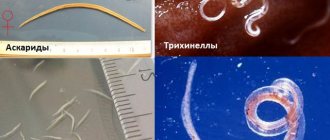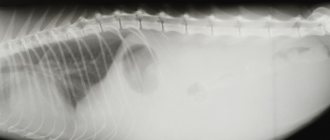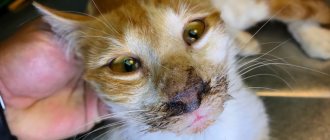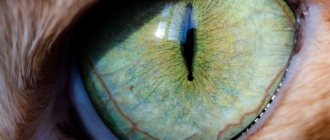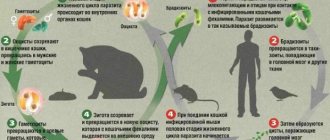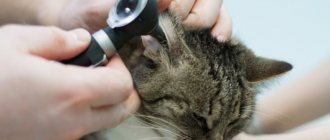Pets, cats and dogs, bring not only joy to the family, but also problems, in particular the danger of infection with parasites. Can a person get worms from a cat? - It definitely can.
Even if your pet does not leave the apartment, she can still become infected with worms, and the first person to receive such a “gift” from her will be your child. Let's figure out which worms affect cats and which of them are transmitted to humans.
What to do in such a situation? To get started, we recommend reading this article. This article describes in detail methods of controlling parasites. We also recommend that you consult a specialist. Read the article >>>
What worms do cats get?
In warm-blooded creatures, which includes us and cats, scientists have counted more than 250 varieties of parasites, but a cat can infect us with only a dozen helminths, which, however, pose a danger to the human body.
Here are just some of the types of helminths that can parasitize a cat’s body:
- Lungworms, which form cysts in the animal’s lungs, leading to the destruction of the lungs; infection occurs from open water sources and by eating crustaceans - crayfish, mollusks, crabs;
- Liver fluke, parasitizing the liver, sometimes the gallbladder and pancreas; infection through raw fish;
- Wide tape. Capable of growing up to 1.5 m, and for humans – up to 12 m; infection through river water, raw fish and crustaceans;
- Cucumber tapeworm, which attacks the intestinal wall with its sharp hooks; infection occurs through carriers - small parasites (fleas, lice eaters);
- Pathogens of alveococcosis, not dangerous for cats, but deadly for humans due to the possibility of liver tumors and metastases in internal organs; infection occurs through eaten rodents;
- Toxocara, which usually affects the intestines of animals and is especially dangerous for kittens; cause damage to vital organs in humans;
- Hookworms affecting the intestinal walls of cats; not dangerous to humans.
Infection of cats with helminths occurs in different ways:
- When eating small rodents (mice, rats);
- Through egg carriers - fleas and flies;
- Through raw fish and meat infected with helminth eggs;
- On a walk, since worm eggs are found everywhere - in the soil, in puddles, in the grass, in the sand;
- Through contact with street cats;
- Licking your fur, which contains worm eggs;
- Through your feces.
What worms can a person get infected from a cat?
Helminthic infestations are varied in nature, but it is important to remember that any helminth that parasitizes the body of a cat or a person deprives it of nutrients, poisons it with the toxins it secretes, and ultimately causes significant and sometimes irreparable damage, some even fatal.
A person can become infected with many types of parasites in other ways, but this often happens through contact with a pet and caring for it.
The most common types of worms that are transmitted to humans from cats belong to the classes of nematodes - roundworms and cestodes - tapeworms.
Roundworms (nematodes)
Tapeworms (cestodes)
Representatives of roundworms that are most often transmitted from cats to humans are roundworms, pinworms and toxocara. In the course of their life activity, these helminths damage the intestinal walls, often causing bleeding and, as a result, anemia; there are problems with bowel function (diarrhea/constipation); Allergic reactions may occur.
Tapeworms - cestodes include echinococcus and various types of tapeworms (bovine, pork, cucumber), which enter the animal's body when eating contaminated meat.
In humans, echinococcus causes the formation of multiple cysts in various organs, resulting in their dysfunction; pose a danger due to the possibility of perforation. Tapeworms in the human body can reach enormous sizes: for example, bovine tapeworm - up to 10-12 m or more.
Cat parasites that can be transmitted to humans include protozoa - single-celled microorganisms that cause serious diseases:
- Toxoplasmosis, which is particularly dangerous for pregnant women (due to possible damage to the fetus) and for children;
- Giardiasis, which affects the intestines and liver;
- Cryptosporidiosis, which causes extremely painful symptoms in the intestines;
- Tularemia, which affects the lymph nodes and causes an inflammatory process;
- Leptospirosis, an acute infectious disease.
And this is not a complete list of diseases caused by helminths and protozoa.
Take a test for worms
Symptoms of helminthiasis: how to understand that there is a “stranger” inside you?
There are many signs of worm infection, and we will list the main ones. If you notice at least a few of the symptoms, you should consult a doctor:
- itching in the anus and genital area (typical of pinworm infection);
- urticaria - redness of the skin and rashes on it (allergic reaction to helminths);
- swelling of the mucous membranes (also observed due to exposure to allergens);
- abdominal pain, nausea, changes in appetite (increase or decrease), rapid weight loss;
- diarrhea, constipation, increased gas formation, other stool disorders;
- changes in blood composition;
- weakness, fatigue, dizziness;
- headache;
- enlarged lymph nodes, liver and spleen;
- pain in joints and muscles;
- blood in the urine, frequent urge to urinate;
- dry cough, shortness of breath;
- constantly elevated temperature.
However, there are cases when helminthiasis is asymptomatic for a long time. We recommend that you pay maximum attention to your health and make an appointment with a doctor for preventative measures. This is especially true after traveling to countries famous for unsanitary conditions.
How are worms transmitted from cats to humans?
The eggs of many worms are characterized by high viability, which they are able to maintain for quite a long time in the external environment: in water, soil, sand, grass. Cats walking outside will inevitably “pick up” these eggs, become infected with worms themselves and infect their owners.
But even if the cat does not leave the apartment, it can become infected with worm eggs that are carried by the wind or that we bring on the soles of our outdoor shoes, and finally, through raw fish and animal meat. As you can see, it is almost impossible to avoid infection with worms, and this means danger for the owners.
Cats are very clean animals, they constantly lick themselves, but this only increases the risk of infection: eggs caught on the fur, when licked, directly enter its oral cavity, and then into the gastrointestinal tract, where they develop into sexually mature helminths capable of laying eggs, and in gigantic quantities, hundreds and thousands.
Thus, any contact with a cat contributes to the transmission of helminth eggs to humans: when we stroke it, kiss it, allow it to lick itself, clean the cat litter, and even just sit on the sofa or chair where the cat was lying before.
Can a child NOT become infected with worms under such conditions? Of course not, because children adore cats, love to play with them, and after that, as a rule, they do not wash their hands.
Failure to comply with personal hygiene rules is one of the main causes of helminthiasis infection, but it is impossible to imagine that all the inhabitants of an apartment thoroughly wash their hands with soap every minute. However, there are preventative methods to prevent infestation of worms from cats.
Find medications for parasites
This service is a small help in finding cures for parasites. To start using it, select the type of parasite. If you don’t know what kind of parasite you are infected with, this parasite identification tool will help you by symptoms.
How to avoid getting infected and protect yourself and your family
How to avoid getting worms from a cat? First of all, you should rid your pet of parasites. The most reliable method is considered to be “worming,” that is, taking anthelmintic drugs.
It is recommended to give them to cats that walk outside once every 3 months, and to those that do not leave the apartment - once every 6 months.
To select the most effective and at the same time safe anthelmintic drug, you need to contact a veterinary clinic. “Human” medicines against worms are strictly contraindicated for animals - they can cause extremely serious consequences, including death.
Fleas are carriers of helminth eggs, so it is necessary to ensure that the animal does not have them. An anti-flea collar will help here, as well as bathing with a special anti-parasitic shampoo.
According to veterinarians, a cat should be bathed no more than 2-3 times a year (!), except in cases where it gets dirty in something.
Particular attention should be paid to the cat's litter box - it is a real accumulation of worm eggs, which they produce in huge quantities, and cats excrete along with feces. Cleaning the cat litter box should be done regularly, wearing gloves and using disinfectants.
Under no circumstances should you feed your cat raw fish and meat; they may also contain helminth eggs and larvae.
If you follow all these rules, then your pet will no longer be a source of danger for you and your children.
Dietary recommendations for the treatment of helminthiasis
Excessive consumption of sweets and dairy contributes to the proliferation of worms. Therefore, during treatment it is necessary to exclude sweets, chocolate, cakes, and milk from the child’s diet. Fermented milk products are useful - kefir, fermented baked milk. It is extremely important to get more fiber in your diet, which has a beneficial effect on intestinal function. It is found in sufficient quantities in foods such as wholemeal bread, fruits, and vegetables. The diet also includes foods containing vitamins A, B, C. These are liver, especially sea fish, egg yolk, cream, butter, fish oil, peas, walnuts. The fruits of sea buckthorn, rose hips, black currants, and red pepper contain large quantities of vitamin C.
Among plant products, garlic, strawberries, apricot kernels, ripe melon juice grown without chemicals, raw carrots and their seeds, watermelon and pumpkin seeds, walnuts, pomegranate juice and St. John's wort tea have good anthelmintic properties. This will help get rid of worms, in addition to the special tablets that the pediatric gastroenterologist will prescribe.
When treating giardiasis, whole milk and foods containing gluten (baked goods and pasta, all cereals except rice, buckwheat and corn) are excluded from the child’s diet. Sour drinks (cranberry, lingonberry fruit drinks, tea with lemon, kefir), boiled meat, fish, vegetable side dishes are recommended.
Preventive actions
So, you need to wash your hands every time after walking, visiting the toilet, and before eating. In addition, the child must have trimmed nails, a neat appearance, and clean underwear. Each person must have their own bed and their own towel. It is also necessary to thoroughly wash vegetables and fruits, and heat process meat and fish.
It is recommended that all family members be periodically examined by a doctor and regularly carry out preventive deworming for pets.
Treatment or drug prophylaxis will be prescribed by a pediatric gastroenterologist. The basis for prescribing any drug to a child of any age should be test results and a conversation with parents.
Services and prices
Primary appointment (examination, consultation) with a gastroenterologist
2,200 rub.
Repeated appointment (examination, consultation) with a gastroenterologist
2,100 rub.
Fecal occult blood test
390 rub.
Stool examinations: Stool analysis for protozoa and helminth eggs
440 rub.
Stool tests: Test for enterobiasis
440 rub.
Giardia Lamblia, cal
410 rub.
It is possible to defeat parasites!
Antiparasitic Complex® - Reliable and safe removal of parasites in 21 days!
- The composition includes only natural ingredients;
- Does not cause side effects;
- Absolutely safe;
- Protects the liver, heart, lungs, stomach, skin from parasites;
- Removes waste products of parasites from the body.
- Effectively destroys most types of helminths in 21 days.
There is now a preferential program for free packaging. Read expert opinion.
Read further:
Are worms contagious to humans? Can a child get infected from a cat?
What worms can you get from a cat: a list of common cat worms
More effective medications for intestinal, protozoan and other parasites in cats
Opisthorchiasis in cats: symptoms, drugs for treatment, can you get infected from a cat?
What is Streptococcus anginosus and what danger does it pose to adults and children?
What do parasitic wasps look like and do they pose a danger to people?
How and what to treat cats with
To eliminate helminthic infestations in cats, broad-spectrum medications are used that are active against most types of helminths that can live in the pet’s body. During treatment, Drontal is prescribed, which helps eliminate tapeworms and roundworms. The medicine contains praziquantel and pyrantel, which enhance the effect of each other.
Drontal eliminates round and tapeworms
Another commonly prescribed medication is Milbemax, which contains milbemycin and praziquantel. The active components destroy both mature individuals and larvae. These medications are given to the pet once. A repeat appointment should be in a week or 10 days.
Milbemax destroys both adults and larvae
The safest drug for worms is Dirofen based on pumpkin oil. The medicine does not have a toxic effect on the pet’s body, and also improves the condition of the gastrointestinal tract, gently removing all parasites from it. Available in the form of a suspension.
Dirofen does not have a negative effect on the liver, as it contains natural ingredients
All of these medications can be used only in the dosage prescribed by the doctor. The drugs are suitable for both therapy and prevention of re-infection.
Bibliography
- Centers for Disease Control and Prevention. Brucellosis. Parasites. Link
- Corbel MJ Parasitic diseases // World Health Organization. Link
- Young EJ Best matches for intestinal parasites // Clinical Infectious Diseases. — 1995. Vol. 21. - P. 283-290. Link
- Yushchuk N.D., Vengerov Yu.A. Infectious diseases: textbook. — 2nd edition. - M.: Medicine, 2003. - 544 p.
- Prevalence of parasitic diseases among the population, 2009 / Kokolova L. M., Reshetnikov A. D., Platonov T. A., Verkhovtseva L. A.
- Helminths of domestic carnivores of the Voronezh region, 2011 / Nikulin P. I., Romashov B. V.
An article for patients with a doctor-diagnosed disease. Does not replace a doctor's appointment and cannot be used for self-diagnosis.
The best stories from our readers
Topic: Parasites are to blame for all troubles!
From: Lyudmila S. ()
To: Administration Noparasites.ru
Not long ago my health condition worsened. I began to feel constant fatigue, headaches, laziness and some kind of endless apathy appeared. Problems also appeared with the gastrointestinal tract: bloating, diarrhea, pain and bad breath.
I thought it was because of the hard work and hoped that it would go away on its own. But every day I felt worse. The doctors couldn’t really say anything either. Everything seems to be normal, but I feel like my body is not healthy.
I decided to go to a private clinic. Here I was advised, in addition to general tests, to get tested for parasites. So in one of the tests they found parasites in me. According to doctors, these were worms, which 90% of people have and almost everyone is infected, to a greater or lesser extent.
I was prescribed a course of antiparasitic medications. But it didn’t give me any results. A week later, a friend sent me a link to an article where some parasitologist shared real tips on fighting parasites. This article literally saved my life. I followed all the advice that was there and after a couple of days I felt much better!
Digestion improved, headaches went away and the vital energy that I so lacked appeared. To be sure, I took the tests again and no parasites were found!
Anyone who wants to cleanse their body of parasites, no matter what types of these creatures live in you, read this article, I’m 100% sure it will help you! Go to article>>>
Still have questions? Ask them in our Anonymous group on VK
How to get rid of parasites in a week. The answer is here!
A reliable and effective remedy for combating worms. Removes all parasites in 21 days.
Go to website
Reviews
Read online
Symptoms that 100% indicate parasites! Take the Test.
How to rid your body of life-threatening parasites before it’s too late!
Read more
Website
To get a consultation
The doctor tells how to quickly get rid of parasites for adults and children!
A parasitologist explains what effective methods exist to combat helminths.
More details
Read completely
Comments
Search for cures for parasites
This service is a small help in finding cures for parasites. To start using it, select the type of parasite. If you don’t know what kind of parasite you are infected with, this parasite identification tool will help you by symptoms.
We recommend reading
The importance of parasites in nature: the role of parasitic worms, fungi and bacteria
01/27/202102/02/2021ecoliv94
Will there be worms if you bite your nails? Why you shouldn't bite your nails
01/25/202102/3/2021ecoliv94
Where do parasites (worms, fungi, bacteria) live in the human body?
01/08/202112/01/2021ecoliv94
Where does the adult human roundworm live in the body?
01/08/202112/01/2021ecoliv94
Treatment of helminthic infestation
All helminthiases are harmful to health. Even when there are no obvious symptoms, parasites poison the body, cause allergies, reduce immunity, and, according to many doctors, shorten life expectancy.
At the first suspicion of helminthic infestation in a person, you need to go to the clinic, get tested and undergo an examination. After examination by a veterinarian, the pet is given a complex remedy. People are prescribed:
- a targeted drug that kills worms of a certain type;
- antihistamines to suppress an allergic reaction;
- sorbents to eliminate intoxication during mass death of parasites.
Echinococcosis requires surgical intervention - the cysts are removed, sometimes with a fragment of the affected organ. For alveococcosis, chemotherapy with anthelmintic drugs and removal of nodes are indicated. Toxocariasis is treated with courses until complete recovery.
